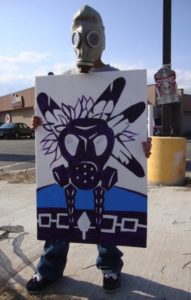Here is the Oneida Appeals Commission Appellate Body’s Decision in Docket No. 14-AC-012:
- December 18, 2014 Appellate Body Decision in Docket No. 14-AC-012, Debraska, Dodge, Cornelius, Graham & Orie v. Oneida Business Committee, Oneida Election Board & Oneida Law Office
On August 20, 2014, the Appellants (Petitioners) filed a request for an Injunction/Temporary Restraining Order against the Respondents to postpone the August 23, 2014 Special Election [of the Oneida Tribal Judiciary until] the inclusion of the SEOTS polling site. They also requested a Declaratory Ruling that all Business Committee and Judiciary elections include the SEOTS polling site. The Trial [Body] answered the Injunction/Restraining Order by denial. The Declaratory Ruling request was not answered by the Trial [Body]. …
The Trial [Body] failed to provide an answer to the Appellants’ request.
By the Trial [Body]’s failure to conduct a hearing on issue[s] presented, we find a denial of their due process rights was made. No hearing was held. …
In respect to the Appellants (Petitioners’) request for Declaratory Ruling, the Trial [Body] failed to conduct a hearing, no record was made. Within the founding General Tribal Council Resolution, 8-19-91-A, which established the [Oneida Appeals Commission] it indicates:
“Whereas, the Indian Civil Rights Act of 1968, 25 USC Section 1301-1303 supports the policy that all Indian Tribes exercising powers of self-government shall insure that individual rights are protected and that people have a right to “petition for redress of grievances.”
It is wiser and more judicially sound process for the Appellate [Body] to have the benefit of the Trial [Body] Decision when considering issues that will have impact beyond the specific election in this case. …
It would be a mistake for us to proceed without the benefit of the Trial [Body]’s ruling.
The case is thereby remanded to the Oneida Tribal Judicial System, Trial [Body] in accordance with Rules of Appellate Procedure, Rule 19 Reversal Affirmance of Modification:
(A) Powers of the Appellate [Body]: Upon appeal from a judgment or order from an original heaing body decision, the appellate [body] of the [Oneida Appeals Commission] may:
(2) Remand the matter to the trial [body] and order a new trial/hearing on any or all issues presented; the order returning a case shall contain specific instructions for the trial [body.]
The Trial [Body] shall conduct further proceedings consistent with this opinion within thirty (30) days including issuing a decision on the Appellants’ (Petitioners’) request in Docket No. 14-TC-173 of a Declaratory Ruling that all Business Committee and Judiciary elections (all significant elections) include the SEOTS pollng site.
This is in accordance with Oneida Tribal Judicial System, Rules of Civil Procedure, Rule 33(B)(1) Declaratory Rule Procedure:
…A Petitioner whose status, rights, duties or other responsibilities under any Rule or Ordinance may petition the agency with enforcement authority over the Rule/Ordinance in question or the OTJS trial [body] in order to settle the question raised. Priority of resolution forum shall lie with the agency if the agency has an established hearing body.
It is so ordered.
In other words:

The Oneida Appeals Commission at work
Unfortunately, the Oneida Appeals Commission’s Trial Body has repeatedly demonstrated that it isn’t fit to judge a pie-eating contest let alone civil & voting rights issues, and that this is the way they treat General Tribal Council members who attempt to defend the Oneida Constitution’s intent to promote the widest possible participation of Oneida people in their governance:

How the Oneida Appeals Commission’s Trial Body treats those who seek to defend General Tribal Council’s Civil & Voting Rights
See also:
